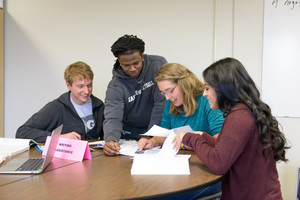Learning Lab offers wide array of resources

CHADRON – Tom Tylee, director of the Office of Academic Success, is dedicated to making the Learning Lab in the King Library a comfortable, welcoming place for students to work individually, collaborate in groups, or study with peer tutors.
Over the past several months, Tylee, who began in January, has led a renovation of the Learning Lab so that it more closely connects the various services offered by his office, including swapping some large folding tables with Residence Life in exchange for furniture more conducive to small group work. Features recently renovated or established in the Learning Lab include the Advisor’s Corner, the Writer’s Corner, a Collaborative Work Station, the Multi-Use Room, and the eXtended Reality (XR) Learning Lab.
“I believe students should have all the tools they need to do their work,” Tylee said.
He has put this philosophy into practice by purchasing a wide variety of software and resources for students.
When entering the Learning Lab on the east side of the main level of the library, students will see the Advisor’s Corner.
“It’s nice to have a faculty presence here,” Tylee said. “They are approachable and we hope that encourages students to stop by and talk, even to advisors who are not in their major.”
Next is the Writer’s Corner, a space created and dedicated in response to a student survey This space provides writers and writing assistants with four computer writing stations, a printer, a collaborative work table, and a semi-private tutoring area.
“Students requested a quiet, secluded, semi-private place for writing,” Tylee said. “They can come here, work on essays with access to the tutors right there.”
Another addition to the Learning Lab is the Collaborative Work Station—a large screen computer surrounded by tables—allowing students and tutors to explore online resources such as interactive periodic tables, virtual art and history museums, and tools for writing, math, and more. Tylee said groups can set up a Chromecast on the screen from any device connected to wi-fi.
Rebecca Wellnitz, a science tutor from Rushville, Nebraska, said she likes being able to help students learn the material and provide tips for studying and note taking.
“It makes it less intimidating for the students knowing that their tutor has also taken the same class recently and knows what it's like learning from that professor,” Wellnitz said.
Writing assistant Jessica Hanks of Kimball, Nebraska, said she appreciates how the Learning Lab supports the tutors’ goal of empowering students throughout the learning process.
“The Learning Lab functions as a space for students of all levels to receive guidance on assignments in a way that allows them to remain autonomous over their own work and their own education,” Hanks said.
Tylee sees combining entertainment and education as an important component in community building so the Learning Lab has collaborated with the Richards’ Media Lab to create the XR Learning Lab. Tylee said eXtended Reality is an umbrella term for immersive media technologies including virtual reality (VR goggles contain audio and video), augmented reality (animated objects interact with real objects) and mixed reality (includes aspects of virtual and augmented reality).
The XR Learning Lab, located in the southeast portion of the Learning Lab, allows tutors and students easy access to explore music, math, space, history, and social conscience issues together in full 3D. For example, one art app, “Tilt Brush,” gives users the ability to feel as if they are painting in a three-dimensional space with paint and light.
The XR lab can be reserved by faculty for class assignments and lab activities, however, there is a two-hour time limit.
Lydia Privett of Wahoo, Nebraska, said she’s enjoyed interacting with VR.
“This has provided me with a different perspective into several areas in my education. The cool part, too, is that it's for everyone. For example, I'm really prone to motion sickness and there are ways around that. I look forward to seeing the new areas we can incorporate it into our education,” Privett said.
Adam Hughes, assistant professor of Communication and Essential Studies, has had the opportunity to use two different headsets, his first virtual reality experience.
“I found both headsets to be fairly immersive, and I imagine they will have much pedagogical value for the visualization of different scientific models and processes. I spent some time in an anatomy program which allows you to inspect particular organs and see what would happen if they undergo some type of failure. Flipping a 3-D heart around while a simulated attack occurs is an interesting experience,” Hughes said.
Hughes plans to use the XR lab with students in one section of his Fundamentals of Oral Communication (CA 125) course by asking them to give a speech in several virtual speaking environments and then provide their analysis of the technology.
“With any technological innovation, I think exploration and integration into the classroom must be carefully measured. I’m glad to be at Chadron State where faculty and students have an opportunity to interact with and hopefully learn with these devices,” Hughes said.
In addition, courses in the Common Intellectual Experience have recommended the “I Am a Man,” app in the XR lab. It is an interactive virtual reality experience created by Dr. Derek Ham set in the historic events of the Civil Rights Movement. According to Ham’s website, the app uses historical film and photographs, along with voice narrations of actual Civil Rights participants, for a new type of interactive-documentary experience intended to foster a personal understanding of the struggles of marginalized people.
The newest addition to the Learning Lab is a Multi-Use Room. This is a soundproof space for online tutoring in all subjects. Headphones and a webcam are provided. Students with a documented disability can also use the room for proctored exams where they need quiet or extra time.
The Learning Lab is open to all Chadron State College students and all services are free. Learn more at csc.edu/learninglab.
Category: Campus News, King Library, Student Services




